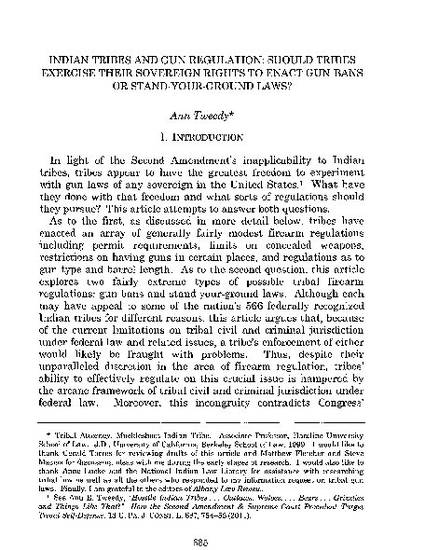
Article
Indian Tribes and Gun Regulation: Should Tribes Exercise Their Sovereign Rights to Enact Gun Bans or Stand-Your-Ground Laws?
78 Albany Law Review 885
(2015)
Abstract
In light of the Second Amendment's inapplicability to Indian tribes, tribes appear to have the greatest freedom to experiment with gun laws of any sovereign in the United States. What have they done with that freedom and what sorts of regulations should they pursue? This article attempts to answer both questions.
As to the first, as discussed in more detail below, tribes have enacted an array of generally fairly modest firearm regulations including permit requirements, limits on concealed weapons, restrictions on having guns in certain places, and regulations as to gun type and barrel length. As to the second question, this article explores two fairly extreme types of possible tribal firearm regulations: gun bans and stand-your-ground laws. Although each may have appeal to some of the nation's federally recognized Indian tribes for different reasons, this article argues that, because of the current limitations on tribal civil and criminal jurisdiction under federal law and related issues, a tribe's enforcement of either would likely be fraught with problems. Thus, despite their unparalleled discretion in the area of firearm regulation, tribes' ability to effectively regulate on this crucial issue is hampered by the arcane framework of tribal civil and criminal jurisdiction under federal law. Moreover, this incongruity contradicts Congress' intent, as manifest in the Indian Civil Rights Act (ICRA).
This article argues that, in light of the formidable obstacles to successful tribal enforcement of gun restrictions, tribes concerned about the proliferation of guns on their reservations - and who might therefore consider gun bans - may be best served by enacting a comprehensive set of gun regulations that makes extensive use of forfeiture, and probably particularly in rem forfeiture, as a penalty for any violation. Tribes that wish to support gun rights are free to do so (as some have), but enacting an expanded right to self-defense, such as a stand-your-ground law, as a partial solution to on-reservation crime is likely to backfire and harm the very tribal members who would be expected to benefit from such a law.
This article first outlines some of the history and background that may influence tribes to enact different types of gun laws. It then briefly describes the gun rights provisions and the various types of firearm regulations that currently exist under tribal law. Finally, it discusses tribes' options in regulating firearms and their use in the future, specifically focusing on the potential benefits of, and problems with, two of the more extreme types of regulation: gun bans and stand-your-ground laws.
Disciplines
Publication Date
2015
Citation Information
Ann E. Tweedy, Indian Tribes and Gun Regulation: Should Tribes Exercise Their Sovereign Rights to Enact Gun Bans or Stand-Your-Ground Laws?, 78 Alb. L. Rev. 885 (2015)
